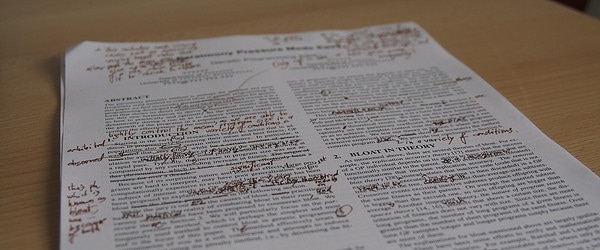Useful Tips to Keep on Top of New Literature
Keeping track of new literature can be a time-consuming process. Here are some helpful hints and tips to help you keep up to date.
Join Us
Sign up for our feature-packed newsletter today to ensure you get the latest expert help and advice to level up your lab work.

Keeping track of new literature can be a time-consuming process. Here are some helpful hints and tips to help you keep up to date.

We show you how to read a scientific paper efficiently to make the most of your reading time.

Organizing your files is simple with Zotero; we’ve got the lowdown on functionality, usability, and access.

If you’re unsure as to how the peer-review process works, the difference between open and double-blind peer review or are wondering if peer review is broken, read on.

Discover more about how ReadCube Papers can help you keep on top of your references.

Learn more about the key features of EndNote to work out if it’s the right reference manager for you.

Learn how Mendeley allows you to organize a library containing your favorite articles and generate citations and bibliographies while writing papers.

PubCrawler automatically searches PubMed and GenBank for queries that you specify, and emails you the results, helping you stay on top of your literature searches.

We show you how to get organized and develop a system to stay on top of your literature reviews.

Are you getting the most out of your PubMed searches or are you wasting lots of time slogging through pages of results? We’ve compiled some top tips to help you refine your searches.

PubMed has had a makeover. Find out where your favorite features have moved to and what’s changed in this shiny new version.

This article provides interesting insider PubMed tips, including how to use search filters and how to set up automatic search alerts.

How do we decide whether our research is having an impact or not? Is there a way to quantify the effect or judge the quality of the articles? Read on to find out about the nuances behind “impact factor.”

Read our top tips to help you get the most out of your scientific literature surveys.

Check out our rundown of the key features of the most popular reference managers to work out which one will be best for you and your research.

The easiest way to keep abreast of what’s going on in your scientific field is to set up a PubMed alert. We show you how.
Before starting any new research project, it’s essential that you have as complete an understanding as possible of the current research literature. Knowing what other people have done will prevent you from duplicating existing work, and will perhaps indicate under-explored niches. If you work in the same subject area over a number of years, you…
When it comes to writing up a research paper, there are many ways to go about it. If it’s just you doing most of the writing, with your supervisor, it is quite straightforward – you can just maintain a single copy of the document and exchange it by email. Software like Microsoft Word can track…

Learning how to speed read can save you a bunch of time; we’ve outlined some simple steps that will dramatically improve your reading speed.

Reading papers on-screen is not something that everyone likes but if you can get used to it, it will help save you time and paper and make filing your literature a breeze. If you use a wide flatscreen monitor, something that is 17inch or bigger, then this tip could make your on-screen reading more pleasurable….
If you search the literature using a comprehensive search engine like Google Scholar, you will get several types of articles listed. Most of them are peer reviewed journal articles and many are patents. But beware of an important distinction between the two: Although patents can contain useful information, they are not authoritative because they are not…

The eBook with top tips from our Researcher community.